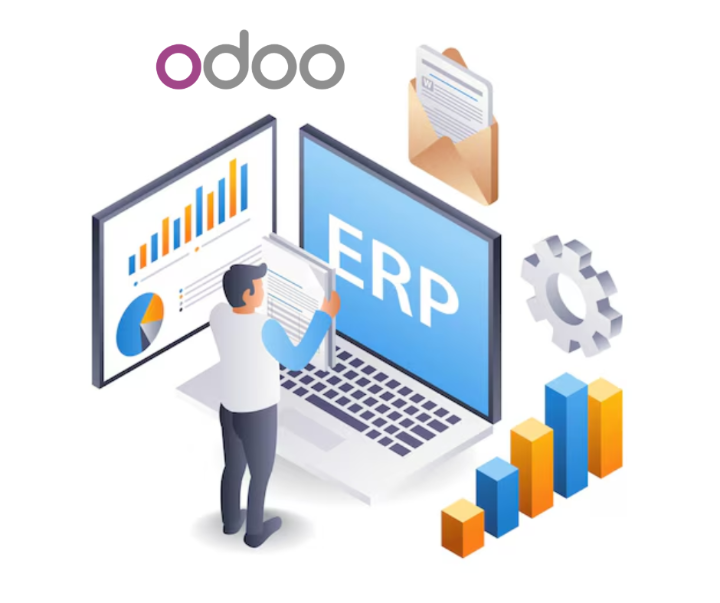In this article, let's explore the concept of Odoo software and its outstanding features in implementing enterprise management solutions below:
1. What is Odoo? Concepts related to Odoo.

1.1 What is Odoo? The history of Odoo software development and its potential in the future
Odoo is a powerful and flexible open-source enterprise resource planning (ERP) software suite, offering limitless customization and feature development capabilities, designed to help businesses manage every aspect of their operations efficiently. With Odoo, you can manage everything from sales, marketing, inventory management to accounting, human resources, and production, all on a single platform.
Odoo was founded in 2025 by Fabien Pinckaers and co-founders in Belgium in 2005, originally known as TinyERP. Initially, TinyERP was just a small ERP software, focusing on basic features such as sales management and inventory management. By 2007, TinyERP was renamed OpenERP and began to expand its features, including CRM, accounting, manufacturing, and human resources. OpenERP quickly became popular due to its flexibility, customizability, and open-source nature. In 2014, OpenERP was officially renamed Odoo, marking an important turning point in the history of this software's development. Odoo not only focuses on providing ERP features but also expands into other areas such as project management, marketing, e-commerce, and website development...
Odoo continuously develops and improves, with new versions released each year. Each version brings new features, performance improvements, and enhanced user experience. With a large user community (over 7 million users worldwide), from startups to large enterprises, Odoo supports 23 languages and allows users to edit content from anywhere.
In the future, Odoo will continuously introduce new improvements, integrations, and expansions, providing APIs for developers. The Odoo community is very strong, with thousands of developers and partners worldwide contributing to the development of the software. With its outstanding advantages, Odoo has great potential for development in the future. Odoo is predicted to continue expanding its features, integrating new technologies such as artificial intelligence (AI) and machine learning to meet the increasingly high demands of businesses.
1.2 Is Odoo a typical example of an ERP system?
Enterprise Resource Planning (ERP) is a comprehensive software solution that helps companies manage and integrate various business processes, from finance and human resources to sales and production. ERP allows businesses to access, control, and plan their activities based on continuously updated information about their resources.
Currently, there are two main types of ERP systems: closed-source ERP and open-source ERP.
Closed-source ERP is software developed and owned by a company or organization. Users are only allowed to use the software according to the license and do not have the right to access or modify its source code.
Open-source ERP is software with publicly available source code, allowing users to freely use, modify, and distribute it.
Odoo ERP is a typical example of open-source ERP software. It provides open-source code, allowing users to easily customize the software to meet their specific needs.
1.3 The main modules of Odoo

As of 2023, Odoo proudly boasts a vast application ecosystem with approximately 46 official modules (subsystems), developed and maintained by the dedicated team at Odoo SA. These are the foundational bricks, meticulously crafted to meet the core management needs of businesses, from basic operations to complex processes. However, this impressive number is not the whole story. It is estimated that by 2025, the number of these applications could exceed 20,000, turning Odoo into a diverse "supermarket" of applications that meets every niche need of businesses.
This continuous development is a testament to Odoo's vigorous vitality, while also affirming its leading position in the world of enterprise resource planning software. With Odoo, businesses not only have a powerful management solution at their fingertips but also a rich ecosystem of applications ready to meet every challenge and development need.
As mentioned, the 46 official modules of Odoo serve as the core foundation, including:
- Sales management (CRM): From managing potential customers, opportunities, and quotes to creating and tracking orders, Odoo CRM helps businesses optimize their sales processes and build strong relationships with customers.
- Warehouse and Production Management (MRP): Odoo provides powerful tools for inventory management, production coordination, and supply chain management, helping businesses optimize production activities and reduce costs.
- Financial management: With accounting modules, income and expenditure management, and financial reporting, Odoo helps businesses accurately grasp their financial situation and make wise decisions.
- Human Resource Management (HRM): Odoo HRM supports businesses in managing employee information, recruitment, salaries and bonuses, performance evaluation, helping to optimize human resource management tasks.
- Marketing: Odoo provides email marketing tools, campaign management, and performance analysis, helping businesses reach potential customers and build a strong brand.
- Project management: Odoo helps businesses plan, track progress, manage project resources, ensuring projects are completed on time and achieve the highest efficiency.
- Customer service management: Odoo provides tools for customer support, request management, and feedback tracking, helping businesses improve service quality and build trust with customers.
- E-commerce: Odoo allows businesses to easily build and manage online stores, reach customers globally, and increase sales.
Odoo Community
The development of Odoo is not only based on the Odoo SA team but also on the significant contributions of the user and developer community worldwide. The Odoo community continuously creates applications and extension modules, making Odoo increasingly powerful and versatile.
3. The implementation cost of Odoo

Odoo offers two versions of enterprise management software to meet the diverse needs of users: Odoo Community and Odoo Enterprise. Each version has its own advantages and limitations, and the implementation costs also differ.
Odoo Community: Free solution for users
Odoo Community is the free version for the user community. It includes some basic modules such as POS, CRM, HRM,... and is open source, allowing users to customize and develop according to their needs. However, this version has some limitations such as being difficult to upgrade, lacking advanced features, and not supporting mobile web and app versions.
Odoo Enterprise: A comprehensive solution for businesses
Odoo Enterprise is the paid version, offering many advanced features and better support for businesses. This version includes two service packages: Standard Package and Custom Package. Businesses can use premium features in modules such as accounting, project management, customer management, inventory management, and production, which are not available in the Odoo Community version.
Feature | Odoo Community | Odoo Enterprise |
Software cost
|
Free
|
Pay the fee (Standard Package or Custom Package)
|
Implementation cost
| Low (mainly customization and development costs) |
Higher (including software costs, deployment, and support)
|
Customization capability
| High (open source) |
High (but custom costs may apply)
|
Feature
|
Basic
|
Enhance
|
Support
|
Community
|
Professional from Odoo
|
Scalability |
Limitations
| High |
4. Advantages and disadvantages of using Odoo
Advantages of Odoo | Disadvantages of Odoo |
Comprehensive and integrated:
Open source and customizable:
Strong community:
Reasonable cost:
Flexibility and scalability:
| Complexity:
Skill requirements:
Support:
Performance:
Security:
|
5. Which businesses are suitable for Odoo?

Odoo is not limited to any specific field. It is particularly suitable for industries such as manufacturing, retail, distribution, e-commerce, marketing, services, construction, real estate, education, healthcare, and many other fields.
Although Odoo has many advantages, the technical support from the provider may be limited. Therefore, businesses should consider building a strong internal IT team or seeking support from Odoo partners to ensure smooth operations.
6. How does Sota Solutions support customers in implementing Odoo?
Sota Solutions is a strategic partner of Odoo in Vietnam. This collaboration brings many benefits to both parties, especially in implementing Odoo solutions for businesses. Recognized as an official partner, Sota Solutions is granted access to the Odoo Enterprise version, including the GitHub repository of Odoo Enterprise. This allows Sota Solutions to fully leverage the features and resources of this version to develop and customize solutions for businesses, enhancing their reputation and reliability in the eyes of customers.
7. Conclusion
Odoo has emerged as a highly promising enterprise resource planning (ERP) software solution, embodying a harmonious blend of robustness, flexibility, and cost-effectiveness. With its high customization capabilities, extensive app store, and large user community, Odoo meets the diverse needs of various types of businesses, from small to large. However, the effective implementation and use of Odoo require an investment of time, resources, and specialized knowledge. Businesses need to carefully consider factors such as scale, industry, budget, and technical capability before deciding to choose Odoo. If you are looking for a comprehensive, cost-effective ERP solution with high customization capabilities, Odoo could be a worthy consideration.